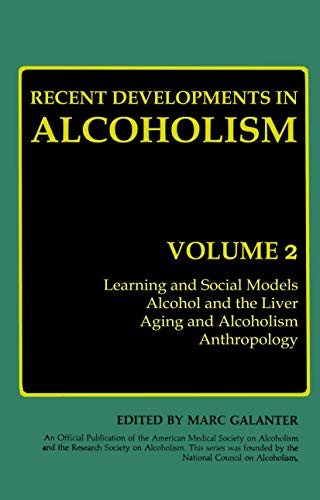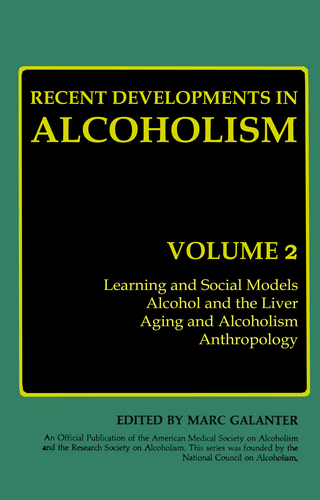
ISBN: 0306415348
[SR: 11260942], Hardcover, [EAN: 9780306415340], Plenum Press, Plenum Press, Book, [PU: Plenum Press], Plenum Press, From the President of the Research Society on Alcoholism The field of … Plus…
| amazon.com |

ISBN: 9780306415340
From the President of the Research Society on Alcoholism The field of alcohol research has been slowly but continuously evolving, taking into its domain an ever-increasing array of scient… Plus…
| Springer.com new in stock. Frais d'envoizzgl. Versandkosten., Livraison non-comprise Details... |

1984, ISBN: 9780306415340
U.S.A.: Plenum Press, 1984. a very good hardcover; an ex-library copy with usual markings; internally pages bright and clean; ---------- SATISFACTION GUARANTEED --------- FAST, … Plus…
| Biblio.co.uk |

ISBN: 0306415348
[EAN: 9780306415340], Gebraucht, guter Zustand, [PU: Plenum Press], Psychology & Psychiatry|Psychopathology|Addiction, Self-Help|Substance Abuse & Addictions|Alcoholism, Ex-library, so so… Plus…
| AbeBooks.de Phatpocket Limited, Waltham Abbey, HERTS, United Kingdom [8420744] [Rating: 5 (von 5)] NOT NEW BOOK. Frais d'envoi EUR 4.58 Details... |

1984, ISBN: 9780306415340
Volume 2, Buch, Hardcover, 1984 ed. [PU: Kluwer Academic/Plenum Publishers], Kluwer Academic/Plenum Publishers, 1984
| lehmanns.de Frais d'envoiTitel z.Zt. nicht lieferbar. (EUR 0.00) Details... |


ISBN: 0306415348
[SR: 11260942], Hardcover, [EAN: 9780306415340], Plenum Press, Plenum Press, Book, [PU: Plenum Press], Plenum Press, From the President of the Research Society on Alcoholism The field of … Plus…
ISBN: 9780306415340
From the President of the Research Society on Alcoholism The field of alcohol research has been slowly but continuously evolving, taking into its domain an ever-increasing array of scient… Plus…
1984
ISBN: 9780306415340
U.S.A.: Plenum Press, 1984. a very good hardcover; an ex-library copy with usual markings; internally pages bright and clean; ---------- SATISFACTION GUARANTEED --------- FAST, … Plus…

ISBN: 0306415348
[EAN: 9780306415340], Gebraucht, guter Zustand, [PU: Plenum Press], Psychology & Psychiatry|Psychopathology|Addiction, Self-Help|Substance Abuse & Addictions|Alcoholism, Ex-library, so so… Plus…

1984, ISBN: 9780306415340
Volume 2, Buch, Hardcover, 1984 ed. [PU: Kluwer Academic/Plenum Publishers], Kluwer Academic/Plenum Publishers, 1984
Données bibliographiques du meilleur livre correspondant
| Auteur: | |
| Titre: | |
| ISBN: |
Informations détaillées sur le livre - Recent Developments in Alcoholism
EAN (ISBN-13): 9780306415340
ISBN (ISBN-10): 0306415348
Version reliée
Date de parution: 1984
Editeur: Kluwer Academic/Plenum Publishers
Livre dans la base de données depuis 2008-01-26T01:53:22+01:00 (Paris)
Page de détail modifiée en dernier sur 2021-04-09T11:04:51+02:00 (Paris)
ISBN/EAN: 9780306415340
ISBN - Autres types d'écriture:
0-306-41534-8, 978-0-306-41534-0
Autres types d'écriture et termes associés:
Auteur du livre: galanter, galante
Titre du livre: recent developments alcoholism, anthropology aging, social anthropology volume
Données de l'éditeur
Auteur: Marc Galanter
Titre: Recent Developments in Alcoholism - Volume 2
Editeur: Springer; Springer US
444 Pages
Date de parution: 1984-02-01
New York; NY; US
Poids: 0,960 kg
Langue: Anglais
85,55 € (DE)
87,95 € (AT)
106,71 CHF (CH)
Contact supplier
XXIV, 444 p. 17 illus.
BB; History, general; Hardcover, Softcover / Geschichte; Geschichte; Verstehen; Syndrom; attention; behavior; identity; intervention; perception; physiology; psychiatry; rehabilitation; Behavioral Sciences; Psychiatry; Public Health; History; Behavioral Neuroscience; Psychiatry; Public Health; Geschichtsschreibung, Historiographie; Neurowissenschaften; Psychiatrie; Public Health und Präventivmedizin; BC; EA
I. Experimental Social and Learning Models of Drinking.- Overview.- 1 A Conditioning Model of Alcohol Tolerance.- 1. Introduction.- 2. Learning and Tolerance.- 2.1. Practice.- 2.2. Pavlovian Conditioning.- 3. Mechanisms.- 3.1. Neurochemistry.- 3.2. Dispositional Tolerance.- 4. Influence on Drinking and Treatment Implications.- 5. Conclusions.- References.- 2 Social Models of Drinking Behavior in Animals: The Importance of Individual Differences.- 1. Animal Models in Medicine and Psychiatry.- 1.1. Neurological Models and Alcohol.- 1.2. Voluntary Alcohol Consumption in Animals.- 2. Effects of Socialization on Alcohol Consumption in Humans and Animals.- 2.1. Social Housing and Alcohol Consumption in Animals.- 2.2. Social Imitation and Alcohol Consumption in Animals.- 2.3. Alcohol Consumption, Dominance Standing, and Social Tension.- 3. Effects of Alcohol Administration on Social Behaviors.- 3.1. Low Doses of Alcohol Increase Aggressive Behaviors.- 3.2. Effects of Acute Alcohol on Other Social Behaviors.- 3.3. Effects of Chronic Alcohol on Social Behaviors.- 3.4. Fetal Alcohol and Maternal Behaviors.- 4. A New Animal Model of Alcoholism Based on Individual Differences That Develop in Social Colonies.- 4.1. Colony-Raised Animals Develop Extremes of Alcohol Preference Compared to Caged Isolates.- 4.2. Behavioral Correlates of the High-Alcohol Consumer.- 4.3. Implications of These Findings: A New Animal Model of Alcoholism.- References.- 3 Social Correlates of Drinking in Contrived Situations.- 1. Introduction.- 2. Drinking Behavior in Natural and Contrived Settings.- 3. Solitary vs. Social Drinking.- 4. Social Drinking and Fantasy.- 5. Drinking and Aggression.- 6. Alcohol and Social Integration in Patients with Psychiatric Syndromes.- 7. Contrived Drinking Situations with Alcoholics.- 8. Social Organization and Affiliation during Alcohol Intoxication.- 9. Issues for Future Research.- References.- 4 Alcohol-Ingestive Habits: The Role of Flavor and Effect.- 1. Principles of Oral Ingestive Habits.- 1.1. Alcohol Consumption as a Feeding Habit.- 1.2. Flavor and Effect as Conditioning Stimuli.- 1.3. Seven Distinctive Features of Flavor-Effect Conditioning.- 1.4. Neural Mechanisms of Flavor and Effect.- 2. Flavor and Effect of Alcohol.- 2.1. Flavor of Alcohol as a Conditioned Stimulus.- 2.2. Effect of Alcohol as an Unconditioned Stimulus.- 3. Interactions between the Feeding System and Other Functional Systems.- 3.1. Antagonistic Processing of Odor: Feeding vs. Defense.- 3.2. Increased Drinking Associated with Fear, Pain, and Stress.- 4. Summary: Implications for Modifying Alcoholic Habits.- References.- 5 Commentary on the Utility of Experimental Social and Learning Models of Alcoholism.- 1. Introduction.- 2. Status of Scientific Models.- 3. What Do Animal Models of Alcoholism Model?.- 4. Models of Alcohol Phenomena.- 4.1. Conditioned Tolerance.- 4.2. Conditioned Aversion and Preference.- 4.3. Social Models of Drinking Behavior in Animals.- 4.4. Social Correlates of Human Alcohol Drinking.- 5. Summary and Conclusions.- References.- II. Alcohol and the Liver: Recent Developments in Preclinical and Clinical Research.- Overview.- 6 Alcohol-Induced Liver Injury: The Role of Oxygen.- 1. Introduction.- 2. NADH Fluorescence from Pericentral and Periportal Regions of the Liver Lobule.- 3. Oxygen Gradient Measured with Mini-Oxygen Electrode.- 4. Local Rates of Ethanol and Acetaldehyde Uptake.- 5. Centrilobular Damage Due to Low-Flow Hypoxia.- 6. Clinical Implications.- References.- 7 Hypermetabolic State and Hypoxic Liver Damage.- 1. Introduction.- 2. Validity of the Premise.- 3. Hypermetabolic State.- 3.1. Relationship between An Increased Rate of Oxygen Consumption by the Liver and Metabolic Tolerance.- 3.2. Permissive Role of Thyroid Hormones.- 3.3. Role of the (Na+-K+)-Adenosine Triphosphatase in the Hypermetabolic State.- 3.4. Centrilobular Hypoxia in Relation to a Hypermetabolic State following Chronic Alcohol Consumption.- References.- 8 Commentary on the Hypermetabolic State and the Role of Oxygen in Alcohol-Induced Liver Injury.- 1. Introduction.- 2. Hypermetabolic State.- 3. Mechanism for the Hypermetabolic State.- 4. Hypoxia and Alcoholic Liver Injury.- 5. Treatment of Alcoholic Hepatitis with Propylthiouracil.- References.- 9 Alcohol-Induced Mitochondrial Changes in the Liver.- 1. Introduction.- 2. Morphological and Histochemical Changes.- 3. Mitochondrial Composition.- 3.1. Lipids.- 3.2. Proteins.- 4. Bioenergetics.- 5. Mitochondrial Acetaldehyde Metabolism.- 6. Structural Properties and Associated Functions of Mitochondrial Membranes.- 7. Oxygen Utilization by Liver Cells: The Role of Mitochondria.- References.- 10 Effect of Ethanol on Hepatic Secretory Proteins.- 1. Introduction.- 2. Hepatic Protein Secretion.- 2.1. Structure of Plasma Proteins.- 2.2. Function of Plasma Proteins.- 2.3. Biosynthesis and Secretion of Plasma Proteins by the Liver.- 3. Effects of Ethanol on Hepatic Protein Secretion.- 3.1. Effects on Protein Synthesis.- 3.2. Posttranslational Effects.- 4. Possible Consequences of the Hepatic Secretory Defect.- 5. Summary.- References.- 11 Use of Colchicine and Steroids in the Treatment of Alcoholic Liver Disease.- 1. Corticosteroids.- 1.1. Rationale.- 1.2. Clinical Studies.- 2. Colchicine.- 2.1. Rationale.- 2.2. Clinical Studies.- References.- III. Aging and Alcoholism.- Overview.- 12 Neurobiological Relationships between Aging and Alcohol Abuse.- 1. Introduction.- 1.1. Types of Brain Lesions.- 1.2. Aging—Normal and Pathologic.- 1.3. Alcohol Abuse.- 1.4. Interactions.- 1.5. Role of Studies in Animals.- 2. Morphology.- 2.1. Gross Pathology.- 2.2. Microscopic Pathology.- 3. Electrophysiology.- 3.1. Base-Line Electroencephalogram.- 3.2. Sleep Electroencephalogram.- 3.3. Evoked Potentials.- 4. Neurochemical Changes.- 4.1. Evaluation of Synaptic Function.- 4.2. Changes with Aging and with Chronic Alcohol Consumption.- 4.3. Interactions.- 5. Summary and Conclusions.- References.- 13 Alcohol Consumption and Premature Aging: A Critical Review.- 1. Introduction.- 2. Development of the Premature-Aging Hypothesis.- 3. Neuropsychological Studies of Alcoholics.- 3.1. Paired-Associate Learning and Short-Term Memory Tests.- 3.2. Divided-Attention Tests.- 3.3. Cued-Learning Tests.- 3.4. Tactual-Perception Tests.- 4. Neuropsychological Studies of Social Drinkers.- 5. NeuroradiologicalStudies.- 6. Electrophysiological Studies.- 7. Does Alcohol Consumption Cause Premature Aging?.- References.- 14 Aging and Alcohol Problems: Opportunities for Socioepidemiological Research.- 1. Introduction.- 2. Strategies of Inquiry on Aging and Alcohol Problems.- 3. Limited Knowledge but Unlimited Opportunity.- 4. Socioepidemiological Domain.- 5. Conceptualization and Operationalization of Alcohol Problems and the Aging.- 6. Research Suggestions on Aging and Alcoholism from the 1981 White House Conference on Aging.- 7. Further Suggestions for Research.- References.- 15 Life Stressors and Problem Drinking among Older Adults.- 1. Introduction.- 2. Prevalence of Problem Drinking among Older Adults.- 2.1. Household Surveys.- 2.2. Clinical Studies.- 2.3. Future Prevalence.- 3. Measurement of Problem Drinking among the Elderly.- 3.1. Alcohol Consumption.- 3.2. Dependence and Withdrawal Symptoms.- 3.3. Adverse Consequences.- 4. Life Stress and Problem Drinking: The Empirical Evidence.- 4.1. Age of Onset, Life Stress, and Problem Drinking.- 4.2. Marital-Employment Status and Problem Drinking.- 4.3. Responsiveness of Older Problem Drinkers to Treatment.- 4.4. Discussion.- 5. A Causal Analysis of the Role of Life Stressors in Problem Drinking.- 6. A Conceptual Framework to Guide Future Research.- 6.1. Sociodemographic and Personal Factors.- 6.2. Acute and Chronic Stressors.- 6.3. Social Resources.- 6.4. Appraisal and Coping Responses.- 7. Conclusion.- References.- 16 Cross-Cultural Aspects of Alcoholism in the Elderly.- 1. Advantages and Limitations of Cross-Cultural Studies.- 2. Aging and Culture.- 2.1. Definition of Elderly.- 2.2. Social Status of the Elderly.- 2.3. Demography of Aging.- 2.4. Distribution of Psychopathology in the Aged.- 3. Culture, Drinking, and Alcoholism.- 3.1. Drinking Patterns.- 3.2. Norms Regarding Use.- 3.3. Intracultural Comparisons.- 4. Aging and Alcoholism.- 4.1. Age-Associated Changes.- 4.2. Age and the Course of Alcoholism.- 5. Discussion.- References.- IV. Contributions from Anthropology to the Study of Alcoholism.- Overview.- 17 Ethnohistory and Alcohol Studies.- 1. Introduction.- 2. Heavy Drinking and Acculturation.- 2.1. Explanatory Models.- 2.2. Critical Perspectives.- 2.3. Discussion.- 3. Concluding Comment.- References.- 18 Social-Network Considerations in the Alcohol Field.- 1. Introduction.- 2. Social-Network Paradigm.- 2.1. Situational Analysis.- 2.2. Network Analysis.- 3. Networks and Social Adaptation.- 4. Networks and Social Identity.- 5. Networks as Pathways to Care.- 6. Networks in Treatment and Recovery.- 6.1. Treatment.- 6.2. Recovery.- 7. Overview and Prospect.- References.- 19 Alcohol Use in the Perspective of Cultural Ecology.- 1. Introduction.- 2. Equilibrium, Integration, and Alcohol Use in Traditional Contexts.- 2.1. Latin America.- 2.2. Africa.- 2.3. Oceania.- 2.4. North American Indians.- 3. Actor-Based Analysis and Ecological Change.- 3.1. American Indians.- 3.2. Variability in the Adaptive Process.- 3.3. The Bar and Modernization.- 3.4. Modern Urban Contexts.- 4. Conclusions.- 4.1. Summary of Findings.- 4.2. Discussion of the Ecological Approach.- 4.3. Suggestions for Further Study.- References.- Selected Contexts of Anthropological Studies in the Alcohol Field: Introduction.- 1. Introduction.- 2. Social Organization.- 3. Intracultural Variation.- 4. Institutional Analysis.- 5. Symbolism and Norms.- 6. Cross-Cultural Comparison.- 7. Importance of Context in Anthropological Studies of Alcohol.- 20 Family Research and Alcoholism.- 1. Introduction.- 2. Literature on Alcoholism and the Family.- 3. Congeniality of Anthropological Approaches with Contemporary Studies.- 4. Review of Anthropologically Oriented Studies.- 5. Directions for New Research.- References.- 21 Alcoholism-Treatment-Center-Based Projects.- 1. Introduction.- 2. Hospital Inpatient Settings.- 3. Nonmedical Inpatient Settings.- 4. Counseling-Rehabilitation Settings.- 5. Other Treatment Intervention Settings.- 6. Idiosyncratic Treatment Settings.- 7. Conclusions.- References.- 22 Cross-Cultural Studies of Alcoholism.- 1. Introduction.- 2. Varieties of Cross-Cultural Studies.- 3. Transcultural Studies of Alcohol Use.- 4. Hologeistic Studies of Alcohol Use.- 5. Implications of Cross-Cultural Studies of Alcohol Use.- 6. Summary.- References.Autres livres qui pourraient ressembler au livre recherché:
Dernier livre similaire:
9781461336174 Recent Developments in Alcoholism (Marc Galanter)
- 9781461336174 Recent Developments in Alcoholism (Marc Galanter)
- 9781461336198 Recent Developments in Alcoholism: Genetics Behavioral Treatment Social Mediators and Prevention Current Concepts in Diagnosis Marc Galanter Editor (Marc Galanter)
- 9780306412028 Recent Developments in Alcoholism: Genetics Behavioral Treatment Social Mediators and Prevention Current Concepts in Diagnosis (Recent Developments in Alcoholism, 1, Band 1) (Marc Galanter)
- 9780306418525 Recent Developments in Alcoholism (n/a)
- 9780306421709 Recent Developments in Alcoholism by Marc Galanter Hardcover | Indigo Chapters (Galanter, Marc (Hrsg.))
< pour archiver...

